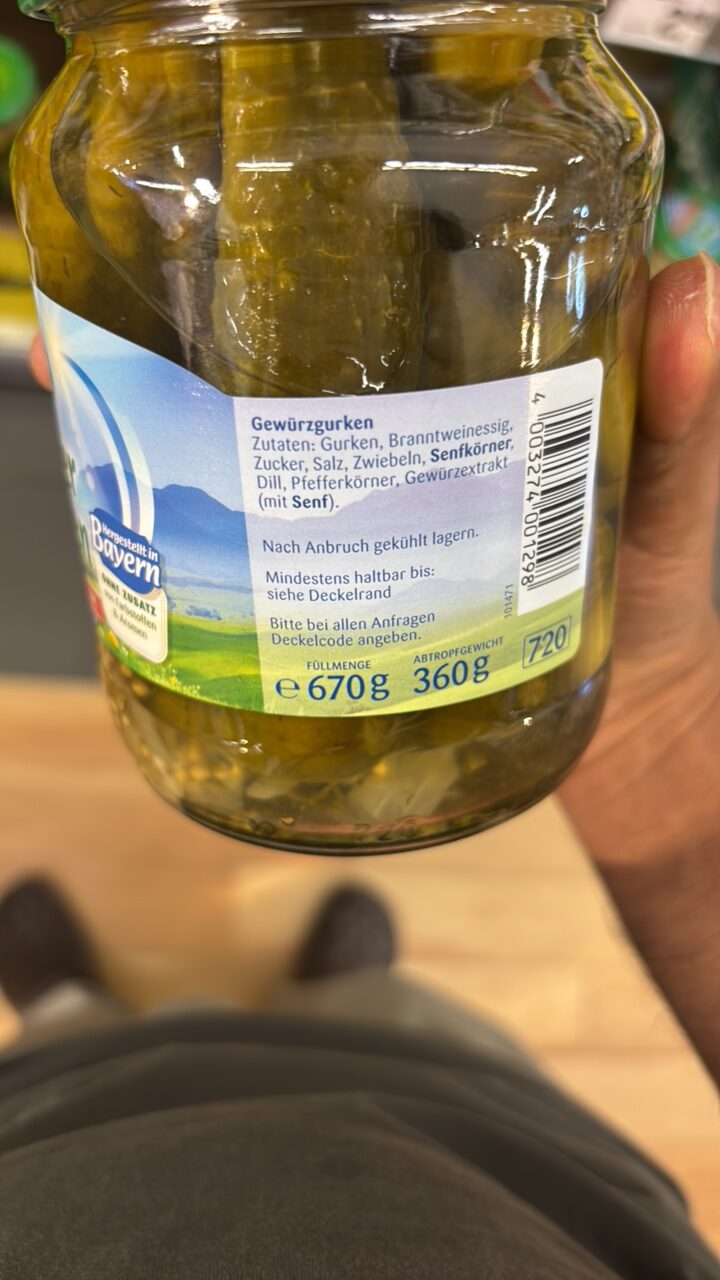
Barcode: 4003274001298
gewürzgurken
HALAL
📝 Reason: Most ingredients in ‘gewürzgurken’ are vegetables, spices or natural condiments and are Halal. However, the ingredient ‘gewürzextrakt’ (spice extract) is ambiguous, since the extraction may use alcohol or animal-derived solvents, making its source unclear and status Doubtful. According to Quran 5:3, Muslims must avoid doubtful or Haram substances. See IFANCA and foodchemadditives.com for further detail.
🏷️ Category: Pickles
📄 Certificates: Vegetarisch, Vegan
Ingredients:
Details
Understanding the Halal Status of Gewürzgurken
Many consumers want to ensure that the food products they consume meet their dietary restrictions. One such popular product is Gewürzgurken, a type of pickled cucumber. In this article, we’ll explore whether Gewürzgurken is Halal by examining its ingredients in detail and addressing any concerns.
Halal Status of Gewürzgurken
The Halal status of Gewürzgurken is classified as HALAL. Most ingredients found in Gewürzgurken consist of vegetables, spices, or natural condiments that are considered Halal. However, one particular ingredient, gewürzextrakt (spice extract), does raise some ambiguity since its extraction can potentially utilize alcohol or animal-derived solvents, which can make its source uncertain.
Diving into the Ingredients
Let’s examine the key ingredients of Gewürzgurken and their Halal status:
- Gurken (Cucumbers): Cucumbers are a naturally Halal vegetable, ensuring that this primary ingredient is safe for consumption. Learn more about cucumbers’ Halal status here.
- Branntweinessig (Spirit Vinegar): Generally deemed Halal by most scholars, spirit vinegar is acceptable as long as no intoxicating effects remain after processing. Further details can be found here.
- Zucker (Sugar): Sugar is usually Halal unless it has been refined with animal-derived charcoal, which is not mentioned in the product. More on sugar’s Halal status.
- Salz (Salt): Salt is a mineral that is always considered Halal. Explore more about salt’s Halal status.
- Zwiebeln (Onions): Onions are naturally Halal, making them a safe ingredient in this mix. Find more on onion Halal status.
- Senfkörner (Mustard Seeds): Mustard seeds are plant-based and recognized as Halal. Read more about mustard seeds here.
- Dill: Dill, being an herb, is also classified as Halal. See more on dill’s Halal status.
- Pfefferkörner (Peppercorns): These are plant-based and considered Halal as well. Discover more about peppercorns.
- Gewürzextrakt (Spice Extract): This ingredient is of concern as its source could be plant-based, animal-derived, or even processed with alcohol, making it unclear. Therefore, it is classified as Doubtful. According to Quran 5:3, Muslims should avoid any dubious or Haram substances. For further information, visit IFANCA and FoodChem Additives.
- Senf (Mustard): Mustard is generally Halal, provided that its additives and processing agents are Halal, which appears to be the case here. Read more on mustard’s Halal status.
Brand and Certification Context
While Gewürzgurken itself is not branded, it falls into the category of pickles—a beloved condiment used globally. It is noteworthy that Gewürzgurken holds vegetarian and vegan certifications, reassuring consumers looking for plant-based diet options. Recognizing Halal certification standards varies across regions, but consistency in ingredients is crucial for ensuring compliance.
Conclusion
In summary, Gewürzgurken is predominantly composed of Halal ingredients, making it suitable for consumption by Muslims. The ambiguity surrounding gewürzextrakt warrants careful consideration, but as long as consumers are informed and cautious, they can enjoy this delicious pickle. If you’re looking for Halal options, Gewürzgurken can definitely be part of your culinary experience!
